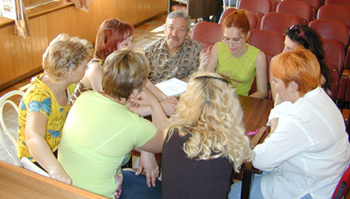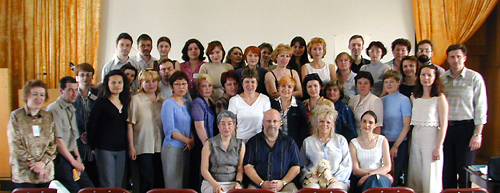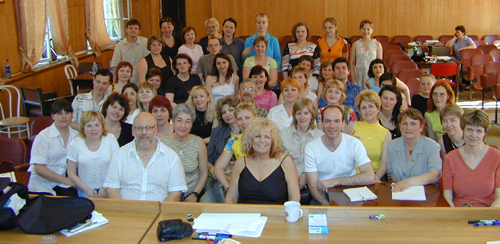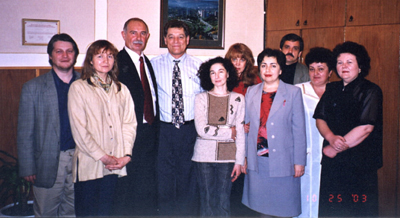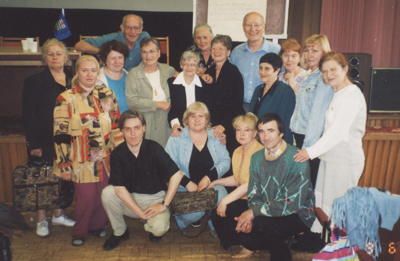Education Component
Community Of Learners
Professional development in-service training was delivered by the University of Calgary affiliated professionals and educators to consecutive cohorts of mental health professionals and leaders in Russia – Communities of Learners (COL). Participants in the cohorts, up to 67 persons in each COL, represented different regions across Russia, and had diverse professional backgrounds (psychiatrists, psychologists, social workers, psychiatric nurses, and administrative leaders), including service consumers. The seminars were facilitated at MRIP for interregional participants who came and stayed in Moscow every time for the two weeks of training.
Each cohort of learners participated in a series of four consecutive intense two-week seminars within a total period of a year and a half that included approximately 60 hours of instruction. Upon the completion of the last training event of the series participants received Certificates of Participation jointly issued by the U of C and the MRIP. Participation in the program was free of charge.
Four (4) series of seminars was completed since 1997. Four consecutive cohorts of learners included the total of 191 graduates representing different regions across Russia, and different mental health professions.
Two of these series of Moscow-Based Professional Training events were delivered in the framework of CRDP:
- COL “A”, 2003 – 2004: First Inter-regional Community of Learners. Participants: 41 Russian psychiatrists, psychologists, mental health administrative leaders and social workers representing 21 regions
- COL “B”, 2005 – 2006: Second Inter-regional Community of Learners. Participants: 67 Russian psychiatrists, psychologists, nurses, mental health administrative leaders, and social workers representing 19 regions.
The description of this Program’s learning events follows.
Guiding Principles
- Train-the-trainer model designed to sustain in-service professional development beyond the term of the project.
- The training program is based on the principles of adult education and designed to maximize opportunities for experiential and reflective learning.
- The training content is focused on system change towards the development and delivery of community based mental health services.
- The teaching process involves both small and large group activities allowing for interactive transformative learning, in contrast to more traditional academic teaching practices (e.g., lecture format focusing on theoretical models).
First Inter-regional Community of Learners (COL “A”) Moscow-Based Professional Training Program (2003 – 2004)
PARTICIPANTS: 41 Russian psychiatrists, psychologists, mental health administrative leaders and social workers representing 21 regions.
Second Inter-regional Community of Learners (COL “B”) Moscow-Based Professional Training Program (2005 – 2006)
PARTICIPANTS: 67 Russian psychiatrists, psychologists, nurses, mental health administrative leaders, and social workers representing 19 regions.
Learning Content
The four courses of the Program curriculum were as follows (click on the "Russian" or "English" for the course outline):
- Collaborative Strategies for the Development of Community Mental Health Services Using Group Processes Russian English Instructors: Dr. Anne Hughson and Bruce Uditsky, May 12 – 23, 2003 (COL “A”), and May 12 – 25, 2005 (COL “B”)
- Community Rehabilitation in Mental Health
- COL “A” Version: Community Rehabilitation in Mental Health Russian English Instructors: Prof. I. Gurovich (Training Leader), Dr. L. Salnikova (Leading Instructor), Dr. Nancy Marlett (Consultant), members of MRIP team, February 2 – 13, 2004
- COL “B” Version: Moving Ahead in Psychiatric Rehabilitation Russian English Instructors: Beth Evans and Faye Knudson, September 26 – October 7, 2005
- Understanding MH Systems and Change Processes Russian English Instructor: Dr. Aldred Neufeldt, June 8 – 12, 2004 (COL “A”), and May 29 – 31, 2006 (COL “B”)
- Introduction to Bio-medical Aspects of Community Mental
Health Practice Russian English Instructor: Dr. John Towes, June 14 – 26, 2004 (COL “A”), and May 22 – 28, 2005 (COL “B”)
MRIP-Led teaching seminars
Outreach training events are delivered by MRIP Program personnel who travel to the regions to provide training on site. The seminars are focused on various, region-specific aspects of psychosocial rehabilitation and community mental health. The training is aimed at enhancing professional knowledge capacity in the Program demonstration model sites, and the content is focused on system change towards the development and delivery of community based mental health services. The outreach MH educational seminars are provided on an on-going basis. In many instances, these events also involve service consumers in the Program regions.
Participants: psychiatrists, psychologists, psychiatric nurses and mental health social workers in regional Program sites
To date, the following learning events have been completed by the MRIP Program team:
- Tambov (April 2003): 3-week outreach seminar for MH professionals
- Tambov (April 2003): 3-day training for psychiatric nurses and social workers
- Tambov (September 5, 2003): Outreach lecture
- Moscow Hospital # 10: monthly outreach case conferences by MRIP in 2003. Recruitment of knowledgeable personnel for demonstration model design
- Omsk (April 2004): Consultations and case conferences
- Stavropol (October 2004): Consultations and case conferences
- Tver (Sept 22, 2004): two separate focused seminars on SW in MH for psychiatrists and nurses
- Moscow-based Inter-regional training seminar series on First Psychotic Episode Treatment model involved MH professionals from all Program demonstration sites and beyond: over 50 participants from 13 territories. This series of seminars is on-going, and included the following sessions to date:
- November 30 – December 16, 2003;
- May 11 – 21, 2004;
- St. Petersburg, June 5 – 6, 2005 (Inter-regional training conference). This conference was attended by over 350 participants, including broad consumer participation. Canadian representation: Dr. D. Addington (University of Calgary);
- November 2005;
- April 2006.
- Ryazan (June 30, 2005): outreach training event; theme: early psychotic episode interventions, and consultations on demonstration model development, including alternative housing programs.
- Tambov (November 2005): outreach training event; theme: demonstration model development, including alternative housing programs.
- Moscow-based Inter-regional Consultations (November 18, 2005) for regional demonstration model leaders, with full participation, including Canadian partners. Theme: objectives of the Program final year, including evaluation and documenting change.
- Omsk (September 26 – 28, 2006): outreach consultative event; theme: evaluation and service standard development in the area of early psychotic episode interventions, rehabilitation, and housing programs.
- Stavropol (October 25 – 27, 2006): outreach consultation event; theme: development and implementation of Program evaluation frameworks.
- All demonstration sites (on-going, beginning in April 2006): outreach consultations and one-on-one telephone consultations with all demonstration site leaders (by Drs. Isaac Gurovich and Alexander Shmukler). Consultations are focused on joint development and implementation of Program evaluation frameworks. These consultations also served the developing of the multiple-partner program evaluation process within the mental health stream, towards the completion date of CRDP.
Stavropol Region trauma Response Training Program
This series of four consecutive training events was designed in response to the need for enhancing knowledge and capacity within Russia's mental health system to address the needs of people who have experienced the deep trauma associated with war and other forms of violent loss. In Stavropol Krai, a number of natural disasters, terrorist acts and other tragic events in the recent years caused a significant increase of forced migration, and high social and psychological tension among the population. By the beginning of 2003, the number of registered forced migrants in Stavropol Krai reached 18,665. According to different authors, the prevalence of post-traumatic stress disorder (PTSD) among persons who survived severe stress varies between 20% and 50%.
Multidisciplinary and inter-sectorial participation was encouraged for this training program, and great attention was paid to enhancing collaborative attitudes and bonding among the program’s 255 participants. Professional development in-service training was delivered by the University of Calgary affiliated professionals and MRIP Program personnel, with the location of all training events in the Stavropol Regional Psychiatric Hospital # 1. Training was free of charge for the participants.
Guiding Principles
- Train-the-trainer model designed to sustain professional development beyond the term of the project.
- The training content is focused on system change towards the development and delivery of community based, inter-sectorial and collaborative trauma response programs.
- The teaching process involves both small and large group activities allowing for interactive transformative learning, in contrast to more traditional academic teaching practices (e.g., lecture format focusing on theoretical models).
255 Participants:
- with diverse professional backgrounds: psychiatry, psychology, psychiatric nursing, social work, including service consumers and university students
- representing diverse sectors: mental health (in- and out-patient settings), police, military, academics, education, social protection, NGOs for refugees and mental health service consumers
- reside and work: mostly in Stavropol city and Stavropol region, also including a small number of representatives from Omsk, Moscow, Krasnodar and Rostov
The Program was comprised of four separate courses delivered in Stavropol, two led by Canadian instructors, and two by a MRIP-based Russian instructor. Each of the Canada-led seminars involved approximately 60 hours of instruction within the 10-day period (click on "Russian" or "English" for the course outline):
- Basic Concepts and Standards of Working with Traumatized Persons Russian English Instructors: Paul Gronnerud and Svetlana Shklarov (Canada), October 13 – 25, 2003
- Psychosocial rehabilitation approaches to treating people with posttraumatic stress disorder (PTSD) Russian English Instructor: Dr. Natalia Semenova (MRIP, Moscow), December 16 – 17, 2004
- Responding to Trauma: Developing Community-based Systems to Help Individuals and Families Russian English Instructor: Dr. Michael Eleff (Canada), October 18 – 26, 2004
- “Post-traumatic growth” and salutogenesis: The potential for positive change through trauma and suffering Russian English Instructor: Dr. Natalia Semenova (MRIP, Moscow), December 22 – 26, 2005
A follow-up and concluding participants’ Conference was held on June 5, 2005 with the participation of Dr. Natalia Semenova (MRIP) and Dr. Donald Addington (Department of Psychiatry, University of Calgary).
Consumer Leadership Training
Three major consumer leadership events were completed since 2003:
- Moscow, June 2004: An Inter-regional Consumer Leadership training event was led by two parent couples from the Canadian Schizophrenia Society: Fay and Jim Herrick, and Barbara and Jacob Ens. Participants were people with mental health disorders and their families – members of the All-Russia Society New Choices (68 people from 26 regions). The event had not been originally planned, but added due to the high need expressed by the Russian partners. It is noteworthy that overlapping activities were facilitated between the professional and consumer training events, which coincided in time, and significantly enriched both programs. (click on the course title to see the outline: Consumer Leadership training event Russian English
- Moscow regional Hospital #10, May 14, 2005: A one-day Consumer Leadership training event for people with mental health disorders and their families (30 consumers and 25 professionals participating). It was led by two Canadian consumer organization experts (Dr. Anne Hughson and Bruce Uditsky).
- Moscow regional Hospital #10, March 24, 2006: A follow-up consumer capacity development event was organized by Hospital #10 on, involving both Canadian (Dr. Aldred Neufeldt, Svetlana Shklarov, and Olga Krassiukova-Enns) and Russian resource personnel (MRIP team).
Curriculum Development
MRIP partners engaged in continuing consultations with RSSU on the development of pre-service SW specialization in mental health. MRIP leaders participated in reviewing and sharpening of the proposed curriculum, with the involvement of professionals and administrative leaders from other regions.
Dr. Gurovich and MRIP team, in collaboration with an inter-regional Committee appointed by the Ministry of Health, and in consultations with RSSU partners, have developed and submitted to the Federal Ministry of Health a comprehensive in-service (after-diploma) training curriculum for mental health specialization that will target graduates of social work faculties and current practitioners. The curriculum is currently under review in the Federal Ministry of Health.
